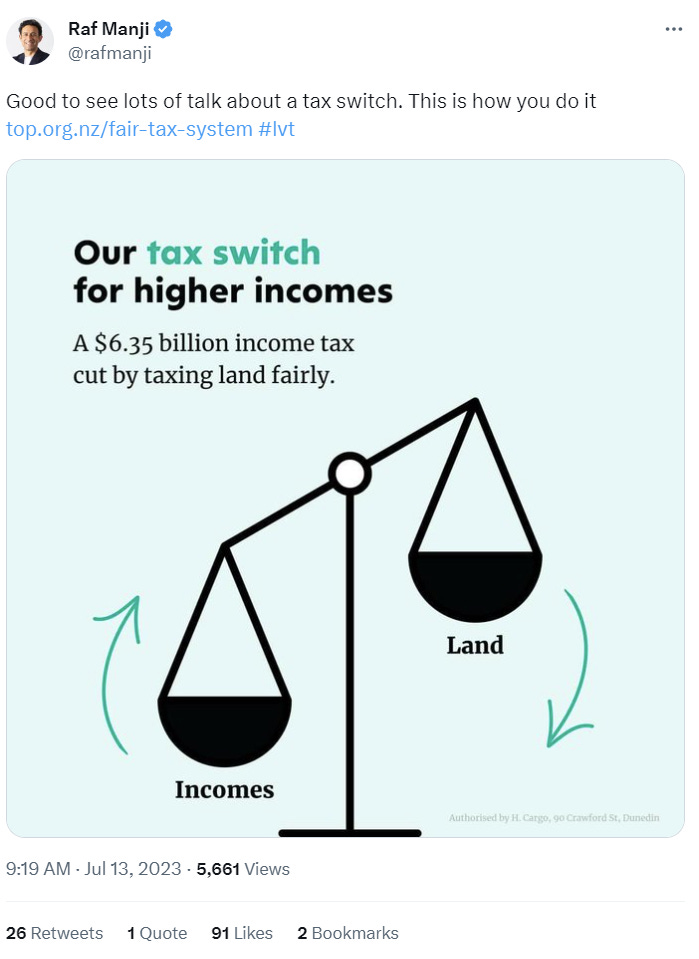⏩Fast Forward Aotearoa #46: 🦐🧠Neo-Cambrian intelligence explosion🌐complexity theory😶🌫️clearer thinking needed📈a surge in productivity?
Last one to leave turn out the lights?
Kia ora and welcome to ⏩Fast Forward Aotearoa, my newsletter and book-in-progress thinking about emerging tech and the unfolding future in my corner of the world, Aotearoa New Zealand. Thanks for reading!
(TIP: If you want to keep receiving the weekly Wednesday Memia emerging tech newsletter but prefer not receive these Aotearoa-focused posts you can manage your subscription preferences here.)
Aotearoa roundup
Some pieces of commentary which caught my attention in the last week. General theme: strategic foreign policy and trade: finely balancing on the tightrope. Domestic policy: sigh.
🌐Complexity theory
In last week’s roundup of links on Aotearoa’s doubling down on its “honest broker” strategic geopolitical positioning (see ✈️✈️Two planes to China), I unintentionally overlooked this piece from Nicholas Khoo from just after the Xi-Hipkins meeting: New Zealand foreign policy turns a corner in Beijing:
Khoo’s argument seems to be that geopolitics trumps trade… and that being inside the protective embrace of AUKUS (Pillar 2…) outweighs maintaining a healthy trading and diplomatic relationship with China:
“…the geopolitical context of 2023 differs markedly from the heyday of globalisation from 1991-2008, when the concept of an ‘international rules-based order' seemed unstoppable.
Welcome to New Zealand’s new reality, where great power politics has created some quite formidable waves for us to navigate.“
Again, personally my sense is that things are more complex than that… geopolitical power games also exist within a complex global economic system over time… and wars are generally bad for business (unless, of course, you’re an arms manufacturer…!) The oversimplified binary US vs. China “great power” narratives which we are frequently being fed bely the robust interconnectedness of the global economy and physical/virtual value networks which tie them together. The whole system is one big tangled ball of spaghetti.
Plus, commentaries about the end of globalisation seem premature at best. (cf. Martin Wolf in the FT last year: Globalisation is not dying, it’s changing:
Trade in goods may be slowing, but the potential for technology-enabled trade in services remains huge
Increasingly non-physical trade will find ways around geopolitical posturing…
Most importantly: when elephants stomp around… mice should get out of the way, not join in. For me, the most sensible response for Aotearoa is the one that the government seems to be signalling… to continue finely navigating a complex balance of more resilient (eg more technology and services) trade networks AND also networks of strategic defence alliances — in order to maintain independence and future agency.
😶🌫️Clearer thinking needed
…On which topic, I very much enjoyed Reuben Steff’s latest article in Newsroom: Clearer thinking needed as NZ battles compounding crises:
“…the government needs to improve its forecasting ability and, with it, preparations for a range of global shocks. Indeed, the New Zealand government has officially concluded that it wants to shift from a reactive posture to regional and international events to a proactive strategy - in essence, to pre-empt threats and issues before they emerge.
This is very aspirational, but how can it be made a reality? I’d wager that it requires not just additional resourcing but (vitally) getting the right people into the right positions. Anyone who has worked in for the Government knows it is good at hiring type-A ‘worker bees’ to deal with the reactive churn of work. This is necessary – the modern day-to-day governance of complex societies involves a constant frenetic activity, much of which goes unnoticed by the public.
But we need critical and creative thinkers in the emerging environment, especially for the ‘over-the-horizon’ forecasting the government wants to achieve. This means less hierarchy and an openness to, well, original and open-minded people largely uninhibited by whatever the prevailing ideological and cultural zeitgeist is at any time.
In short – we will need people who know how to think (and to train people in this), rather than those concerned about what they should be thinking and expressing. This will require senior officials to check their ego – they won’t often be the smartest people in the room even as they are used to being treated as if they are.”
No disagreement there.
📈A surge in productivity?
David Skilling’s latest piece on soaring global debt levels provides a hint of where governments should go fishing…:
💨Last one to leave turn out the lights?
Chris Hipkins’ “captain’s call” pronouncement — from the sidelines of the NATO Summit in Vilnius, Lithuania — that his Labour Party will rule out introducing a wealth tax or capital gains tax for as long as he is leader has simultaneously defused National/ACT’s main campaign thrust … while provoking a mix of despair / outrage among the progressive left:
Newsroom’s Jenna Lynch didn’t pull her punches: Chris Hipkins' cowardly Robin Hood tax backdown - what does Labour stand for?
Bernard Hickey in Te Kākā put out one of his most powerful pieces of journalism yet (and that’s saying something), So this is how the story ends:
“The future of Aotearoa’s political economy will now remain frozen in its stagnant, unequal, unjust, unproductive and unhealthy state for the foreseeable future. That’s what our leaders, and ultimately the only voters that matter, have decided. Those hoping to change that frozen landscape should now look after themselves and their families, and/or hope and work for an electoral miracle that gives parties who want such taxes dominant positions in any post-election negotiation…
Any renters without family resources or strong prospects of marrying into wealth need to know they now have no normal pathway to home ownership for their families for another generation. Realistically, they should look to migrate to Australia, which has a capital gains tax that helps fuel higher capital investment, higher productivity, higher wages and a much better prospect of saving a house deposit after the rent (albeit high and rising) is paid.“
Recommend reading in full, his analysis is incisive. It’s definitely likely that young people (and other non-property owners) will just leave in their droves and find a better, more affordable life elsewhere.
Bernard also interviewed commentator Danyl McLauchlan for a detached analysis of what drives policy decisions like these: a state captured by bureaucrats, administrators and consultants:
“modern politics has created a type of administrative and captured state where voters don’t get to debate big ideas or enact large change any more, but are instead corralled by a range of forces into choosing political managers of the status quo where the real power is with unelected officials.“
The announcement does seem to have energised the Greens who may actually benefit from a higher turnout from younger (renting) voters.
With ACT riding relatively high in the polls, perhaps the unspoken story behind Hipkins’ rationale is an unwillingness to go head-to-head with ACT and National’s relatively huge campaign warchest. Where is this funding coming from? More thorough journalistic investigation would be helpful (more where this came from in The Spinoff, With 100 days to go, this is the lay of the election land):
3 months until election day, a lot of water still to go under the bridge. It’s really tight and it looks like any government will have a razor-thin majority, if at all.

The only three potential circuit-breakers I see right now:
National swapping out Luxon for Willis a month out from the election… and Willis riding a similar wave of “Let’s Do This“ goodwill that propelled Jacinda Ardern to power in 2017, bringing wavering voters back in from ACT and Labour. (What does she or Luxon actually stand for, though…?)
National doing a constituency “cup of tea” deal with New Zealand First to get NZF back into Parliament. (But they’d have to be really desperate…why would they do that only to hand Winston the balance of power, again…!)
TOP leader Raf Manji’s campaign to win Ilam in Ōtautahi. If polls stay the same and Raf does win the constituency (on merit and/or also with a “cup of tea” deal with one/both of the two main parties), then TOP becomes a more reasonable “balance of power” decider with its stated intention of sitting on the cross-benches. In particular, TOP’s Land Value Tax policy could then be leveraged in as the best potential compromise solution to rebalancing the tax take — and sensibly so: it catches most of the wealth held in the country, will be quick and easy to introduce and most importantly also shifts the economy towards more productive investment. (Interestingly Hipkins didn’t seem to explicitly rule out LVT).
Too close to call right now.
🤦Meanwhile this morning:
Sometimes I live in a parallel universe…
⏩Fast Forward Aotearoa scenario 3: Neo-Cambrian intelligence explosion
(The penultimate part of the final chapter of the book…!)
🦐🧠Scenario 3: Neo-Cambrian intelligence explosion
“Superintelligent human-AI hybrid symbionts emerge within a small number of years, quickly work out how to fund and arm themselves better than nation-state governments and establish a new solar-system-wide order that looks *nothing like* anything we’ve known before.”
Science fiction has long been way ahead of mainstream culture in exploring potential post-Singularity futures with “superintelligent” artificial general intelligence (ASI). The scenario above is just one variant on the efforts of numerous sci-fi authors, philosophers and filmmakers who have imagined a wide array of potential post-ASI outcomes.
For the purposes of discussion here, the potential outcomes break down into three categories:
Human-friendly ASI eg. VIKI (I, Robot), The Culture Minds (Iain M Banks Culture novels)
Actively hostile ASI eg. HAL 9000 (2001: A Space Odyssey), Skynet (Terminator), Ava (Ex Machina)
Indifferent ASI eg. Paperclip maximizer (Nick Bostrom), Wintermute (Neuromancer), The Lobsters (Accelerando)
Keep reading with a 7-day free trial
Subscribe to Memia to keep reading this post and get 7 days of free access to the full post archives.









